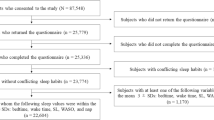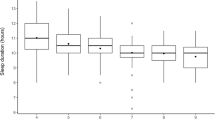Abstract
The aim of the study was to investigate the possible existence of a bifurcation point in sleep duration, which could differentiate children with behavioral problems from those without. We conducted a survey of children’s sleep and health between June and July 2012. A total of 383 children aged 4–6 years were studied (193 boys, 190 girls; average age 4.7 years; 223 and 160 children attended kindergarten and childcare centers, respectively), based on their parents’ reports using the Children’s ChronoType Questionnaire and the Strength and Difficulties Questionnaire. The dependent variable was the dichotomized behavior of total behavioral problems; the cut-off value was ≥13 points. The independent variable was sleep duration. The bifurcation point of sleep duration was the median value: 9.5 h for sleep period, 10.0 h for time in bed (TIB), and 10.5 h for the sum of TIB and naptime (24 h TIB). Binomial multiple logistic regression analyses were performed separately for sleep period, TIB, and 24 h TIB, which were controlled for chronotype, sex, age, and childcare programs; those corresponded to Models 1, 2, and 3, respectively. The results show that there was no significant association between total behavioral problems and sleep duration. However, using morning-type as a reference, adjusted odds ratios (95 % confidence intervals) for neither-type and evening-type were 2.06 (1.12–3.76) and 3.72 (1.60–8.66) in Model 1, 2.09 (1.14–3.82) and 3.89 (1.71–8.88) in Model 2, and 1.89 (1.03–3.50) and 3.61 (1.55–8.40) in Model 3.

Similar content being viewed by others
References
Matricciani L, Blunden S, Rigney G, Williams MT, Olds TS. Children’s sleep needs: is there sufficient evidence to recommend optimal sleep for children? Sleep. 2013;36:527–34.
Roepke SE, Duffy JF. Differential impact of chronotype on weekday and weekend sleep timing and duration. Nat Sci Sleep. 2010;2010:213–20.
Doi Y, Ishihara K, Uchiyama M. Sleep/wake patterns and circadian typology in preschool children based on standardized parental self-reports. Chronobiol Int. 2014;31:328–36.
Werner H, Lebourgeois MK, Geiger A, Jenni OG. Assessment of chronotype in four- to eleven-year-old children: reliability and validity of the Children’s Chronotype Questionnaire (CCTQ). Chronobiol Int. 2009;26:992–1014.
Doi Y, Ishihara K, Uchiyama M, Takimoto H. Development of the Japanese version of Children’s ChronoType Questionnaire. Jpn J Sleep Med. 2013;7:486–93 (in Japanese).
Ishihara K, Doi Y, Uchiyama M. The reliability and validity of the Japanese version of the Children’s ChronoType Questionnaire (CCTQ) in preschool children. Chronobiol Int. 2014;31:947–53.
Goodman R. The Strengths and Difficulties Questionnaire: a research note. J Child Psychol Psychiatry. 1997;38:581–6.
Matsuishi T, Nagano M, Araki Y, et al. Scale properties of the Japanese version of the Strengths and Difficulties Questionnaire (SDQ): a study of infant and school children in community samples. Brain Dev. 2008;30:410–5.
Goodman R. Psychometric properties of the strengths and difficulties questionnaire. J Am Acad Child Adolesc Psychiatry. 2001;40:1337–45.
Doi Y, Ishihara K, Uchiyama M. Reliability of the Strengths and Difficulties Questionnaire in Japanese preschool children aged 4–6 years. J Epidemiol. 2014;24:514–8.
Paavonen EJ, Porkka-Heiskanen T, Lahikainen AR. Sleep quality, duration and behavioral symptoms among 5-6-year-old children. Eur Child Adolesc Psychiatry. 2009;18:747–54.
Touchette E, Petit D, Seguin JR, Boivin M, Tremblay RE, Montplaisir JY. Associations between sleep duration patterns and behavioral/cognitive functioning at school entry. Sleep. 2007;30:1213–9.
Komada Y, Abe T, Okajima I, et al. Short sleep duration and irregular bedtime are associated with increased behavioral problems among Japanese preschool-age children. Tohoku J Exp Med. 2011;224:127–36.
van der Heijden KB, de Sonneville LM, Swaab H. Association of eveningness with problem behavior in children: a mediating role of impaired sleep. Chronobiol Int. 2013;30:919–29.
Bax MC. Sleep disturbance in the young child. Br Med J. 1980;280:1177–9.
Fukuda K, Asaoka S. Delayed bedtime of nursery school children, caused by the obligatory nap, lasts during the elementary school period. Sleep Biol Rhythms. 2004;2:129–34.
Matsuoka M, Nagamitsu S, Iwasaki M, et al. High incidence of sleep problems in children with developmental disorders: results of a questionnaire survey in a Japanese elementary school. Brain Dev. 2014;36:35–44.
Acknowledgments
This work was supported by JSPS KAKENHI Grant Number 23390181 and partly by a Research Grant from the Japan Society for Promoting Science and Technology Agency (22591301, 2011–2012). The authors thank all the parents, kindergartens, and childcare centers that participated in this study. The authors also thank Midori Kajitani for her assistance.
Author information
Authors and Affiliations
Corresponding author
Rights and permissions
About this article
Cite this article
Doi, Y., Ishihara, K. & Uchiyama, M. Sleep duration in relation to behavioral problems among Japanese preschool children. Sleep Biol. Rhythms 14, 107–111 (2016). https://doi.org/10.1007/s41105-015-0028-4
Received:
Accepted:
Published:
Issue Date:
DOI: https://doi.org/10.1007/s41105-015-0028-4




